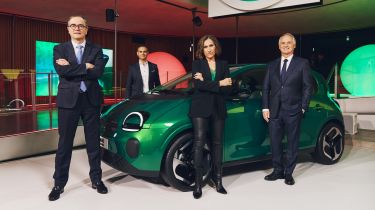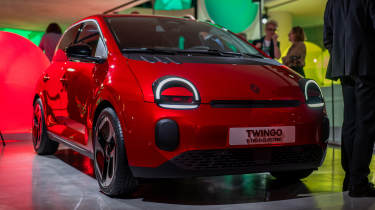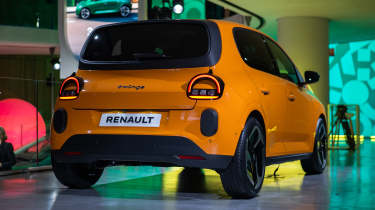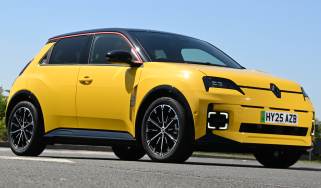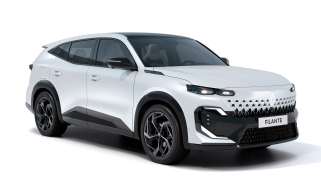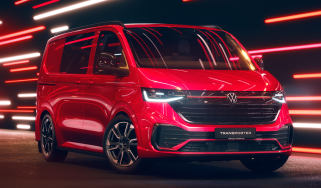Renault goes to war on high car prices, regulation and China’s cost advantage
The Renault CEO says speeding up development times will suppress new car prices – and new Twingo is just the start
Been priced out of the new car market? You’re not alone: Francois Provost, the newly appointed CEO of Renault Group, reckons a staggering 3 million new car sales have been lost each year since the Covid-19 and semiconductor crises receded, because people’s incomes haven’t kept up with price inflation.
Provost believes Renault has the answer: speeding up new car development times to match the industry-leading Chinese and getting European lawmakers to throttle back on regulation. The result would be a stunning 40 per cent reduction in new car development costs, he claims, enabling the French group to keep prices down to compete with low-cost Chinese manufacturers.
Evidence that the cost balance is swinging back in buyers’ favour starts with Renault’s new Twingo. Priced from under 20,000 pounds or euros, the electric city car has a standard 163-miles of range, Google connected infotainment and “a lot of design for not a lot of money,” quipped group design boss Laurens van den Acker to Auto Express.
Provost spoke to journalists at the Twingo’s Paris unveiling. “The problem of the European market is that today's prices are too expensive, so we have to change the European automotive industry playbook. Today, we have decarbonisation regulation and prices are too high. People are not happy. They cannot buy new cars. You have the ageing of the [car parc] to 12.5 years, with no [emissions reduction], no safety improvement and as a consequence you destroy the automotive industry.” He believes smaller suppliers are already going to the wall due to reduced demand, with fewer jobs reducing society’s spending power.
It’s a familiar battle cry from European car bosses: Provost’s predecessor Luca de Meo spoke out with Stellantis chairman John Elkann, before he jumped ship to run Gucci-owner Kering.
So it’s encouraging news that Renault has reduced Twingo costs by 25 per cent: part of it is down to the car’s compact size and a reduction from 1200 parts to 750. Also, there are only two wheel sizes and four paint colours at launch.
Learning from China
But it’s also down to squeezing delays out of the engineering process. “The biggest advantage of Chinese competitors is their speed of development. If you develop quicker you deliver new innovations quicker and decrease costs,” says Provost. “This leads to a new way to engineer cars. That’s why the Twingo is a symbolic tipping point for Renault.”
Renault learned how to achieve ‘China speed’ by setting up the Advanced China Development Centre in Shanghai, recruiting local engineers and turbocharging decision-making. The CEO’s next job is to embed those working practices in its Technocentre in south-west Paris, to unlock savings across the board and keep Renault’s range in a perpetual motion of development and neck-and-neck with Chinese rivals.
He also wants Europe to mimic how the Chinese caught up in car-making, by entering into joint-ventures with western firms decades ago. “The best way is to say: ‘you are welcome to come to Europe but you need to produce [here]’. Use our suppliers, dedicate resources, investment for employment and technology in Europe and develop your cars here.”
Faster car development and fewer new regulations
A second critical shift is needed to realise the magic 40 per cent total development saving: a freeze on new regulations to unlock another 10-15 per cent. Currently, European car makers are on the hook to implement another 107 rules by 2030, covering areas including emissions, safety, data protection, materials and more.
“I just ask: no new regulation for 10, 15, 16 months. Then we can dedicate our engineers to decrease the cost, improve the cars and lower the price [for customers].” Renault has a quarter of its workforce working on regulatory implementation, the CEO calculates.
“And the regulation should be applied only on new models, not retroactively. Today we are the [only region] in the world where, once you’ve introduced a new car, you have to apply new regulations to it one year later.” Provost also wants new guidelines to be applied in batches, ideally every couple of years.
The leader is particularly dreading new years eve leading into 2030, when the corporate CO2 average will drop from 95 to 49g/km. “It is impossible: no OEM will be capable of doing that. The European industry proposes flexibility over five years, from 2028 to 2032, in order to cope with this huge one shot decrease of CO2”.
Did you know you can sell your car through Auto Express? We’ll help you get a great price and find a great deal on a new car, too.

